|
|
|
Sort Order |
|
|
|
Items / Page
|
|
|
|
|
|
|
| Srl | Item |
| 1 |
ID:
133658
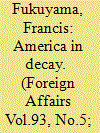

|
|
|
|
|
| Publication |
2014.
|
| Summary/Abstract |
The problems with American politics today stem from the basic design of U.S. political institutions, exacerbated by increasingly hostile polarization. Unfortunately, absent some sort of major external shock, the decay is likely to continue for the foreseeable future.
The creation of the U.S. Forest Service at the turn of the twentieth century was the premier example of American state building during the Progressive Era. Prior to the passage of the Pendleton Act in 1883, public offices in the United States had been allocated by political parties on the basis of patronage. The Forest Service, in contrast, was the prototype of a new model of merit-based bureaucracy. It was staffed with university-educated agronomists and foresters chosen on the basis of competence and technical expertise, and its defining struggle was the successful effort by its initial leader, Gifford Pinchot, to secure bureaucratic autonomy and escape routine interference by Congress. At the time, the idea that forestry professionals, rather than politicians, should manage public lands and handle the department's staffing was revolutionary, but it was vindicated by the service's impressive performance. Several major academic studies have treated its early decades as a classic case of successful public administration.
|
|
|
|
|
|
|
|
|
|
|
|
|
|
|
|
| 2 |
ID:
109529
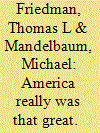

|
|
|
| 3 |
ID:
126274
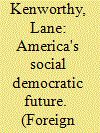

|
|
|
|
|
| Publication |
2014.
|
| Summary/Abstract |
Since March 2010, when U.S. President Barack Obama signed the Affordable Care Act into law, the ACA has been at the center of American politics. Tea Party activists and their allies in the Republican Party have tried to stymie the law at nearly every turn. The Republican-controlled House of Representatives has voted more than 40 times in favor of repealing or defunding it, and last October the House allowed a partial shutdown of the federal government in an attempt to block or delay the law. The controversy surrounding the ACA shows no sign of ending anytime soon.
|
|
|
|
|
|
|
|
|
|
|
|
|
|
|
|
| 4 |
ID:
097755
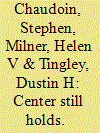

|
|
|
|
|
| Publication |
2010.
|
| Summary/Abstract |
Recent research, including an article by Charles Kupchan and Peter Trubowitz in this journal, has argued that the United States' long-standing foreign policy orientation of liberal internationalism has been in serious decline because of rising domestic partisan divisions. A reanalysis of the theoretical logic driving these arguments and the empirical evidence used to support them suggests a different conclusion. Extant evidence on congressional roll call voting and public opinion surveys, which is often used to support the claim that liberal internationalism has declined, as well as new evidence about partisan divisions in Congress using policy gridlock and cosponsorship data from other studies of American politics do not demonstrate the decline in bipartisanship in foreign policy that conventional wisdom suggests. The data also do not show evidence of a Vietnam War or a post-Cold War effect on domestic partisan divisions on foreign policy. Contrary to the claims of recent literature, the data show that growing domestic political divisions over foreign policy have not made liberal internationalism impossible. It persists as a possible grand strategy for the United States in part because of globalization pressures.
|
|
|
|
|
|
|
|
|
|
|
|
|
|
|
|
| 5 |
ID:
131693
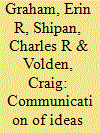

|
|
|
| 6 |
ID:
149504
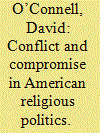

|
|
|
|
|
| Summary/Abstract |
DAVID O’CONNELL reviews two new books on religion’s role in American politics, Mark A. Smith’s Secular Faith: How Culture Has Trumped Religion in American Politics and Neil J. Young’s We Gather Together: The Religious Right and the Problem of Interfaith Politics. He argues that these works of scholarship show us how people of different religious and moral beliefs are not as politically divided as one might think.
|
|
|
|
|
|
|
|
|
|
|
|
|
|
|
|
| 7 |
ID:
130279
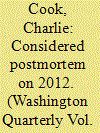

|
|
|
|
|
| Publication |
2013.
|
| Summary/Abstract |
The November 2012 election results revealed and underscored greater changes in American political dynamics than many of us had anticipated. Republicans, who had won the popular vote in four out of the five presidential elections from 1968-1988, have now lost five out of the last six, with 2000 notably featuring a Democratic popular vote win but George W. Bush capturing the Electoral College. Republicans last won 300 or more electoral votes in 1988; Democrats have now exceeded 300 in four of the last six elections, from 1992-2012. Keeping in mind that 270 electoral votes are needed to win, Democrats have now carried 18 states plus the District of Columbia in six consecutive elections, a combination totaling 242 electoral votes-89 percent of the 270 needed to win an election. One can now say that Democrats have a home field advantage in presidential races.
|
|
|
|
|
|
|
|
|
|
|
|
|
|
|
|
| 8 |
ID:
123841
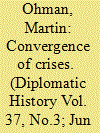

|
|
|
|
|
| Publication |
2013.
|
| Summary/Abstract |
This article argues that the Missouri Crisis 1819-1821 was a consequence of growing concerns about geopolitical realignments in the post-Napoleonic world and the impending international recession. Scholars have typically explained the conflict over slavery's expansion as the last convulsion of the first-party system, a reflection of budding humanitarian considerations, or as a product of the growing contradictions between slavery and freedom in an era of an emerging liberal capitalist ethos and a democratization of American politics. The central element of the northern restrictionist position, however, was that slavery's expansion into the western territories would seriously impede the United States' ability to compete economically and mobilize militarily in times of war. In light of persistent tensions with foreign powers, the perceived risk of renewed great power warfare, international markets glutted, and every branch of the economy paralyzed, restrictionists saw the halting slavery's expansion as a necessary measure to save the federal republic.
|
|
|
|
|
|
|
|
|
|
|
|
|
|
|
|
| 9 |
ID:
089142
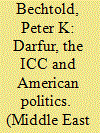

|
|
|
|
|
| Publication |
2009.
|
| Summary/Abstract |
During the past half-decade, those Americans following international affairs have been inundated by media accounts of genocide in Darfur, supplemented by full-page advertisments in the major newspaper, sponsored mostly by the save Darfur Coalition.
|
|
|
|
|
|
|
|
|
|
|
|
|
|
|
|
| 10 |
ID:
084613
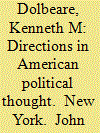

|
|
|
|
|
| Publication |
New York, John Wiley & Sons, 1969.
|
| Description |
ix, 516p.
|
|
|
|
|
|
|
|
|
|
|
|
Copies: C:1/I:0,R:0,Q:0
Circulation
| Accession# | Call# | Current Location | Status | Policy | Location |
| 003566 | 320.50973/DOL 003566 | Main | On Shelf | General | |
|
|
|
|
| 11 |
ID:
143149
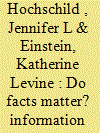

|
|
|
| 12 |
ID:
133657
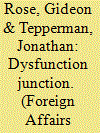

|
|
|
|
|
| Publication |
2014.
|
| Summary/Abstract |
American politics today are a mess, and since the distraction and paralysis of the world's hegemon has such obvious global significance, we decided to turn our focus inward, exploring the sources and contours of the American malaise.
|
|
|
|
|
|
|
|
|
|
|
|
|
|
|
|
| 13 |
ID:
090249
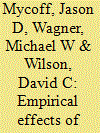

|
|
|
|
|
| Publication |
2009.
|
| Summary/Abstract |
The effect of voter-identification (voter-ID) laws on turnout is a hot-button issue in contemporary American politics. In April of 2008, the U.S. Supreme Court affirmed Indiana's voter-ID law, the nation's most rigorous, which requires voters to arrive at the polls with a state-issued photo ID containing an expiration date (Crawford v. Marion County 2008). In a famous incident highlighting how Hoosiers were dealing with their state's voter-ID law, representative Julia Carson (D-IN) was initially blocked from voting during Indiana's 2006 primary election for failing to comply with Indiana's voter-identification standard. Carson identified herself with her congressional ID card; since that card did not include an expiration date and therefore did not meet Indiana's voter-identification law, she was turned away at the polls before later being allowed to vote (Goldstein 2006). The rising wave of public, political, and legal debate crested two years later in the wake of the Supreme Court ruling and during the Indiana primaries, with reports of a dozen nuns being denied ballots at the polls due to their lack of appropriate identification (Urbina 2008).
|
|
|
|
|
|
|
|
|
|
|
|
|
|
|
|
| 14 |
ID:
110316


|
|
|
|
|
| Publication |
2012.
|
| Summary/Abstract |
OF ALL the U.S. presidents since Franklin Roosevelt, none stands taller in history or exercises a greater lingering influence on American politics than Ronald Reagan. Republican politicians invoke his name as example and lodestar, and Democrats have granted him increasing respect as the passions of his presidential years have ebbed with time. Surveys of academics on presidential performance, initially dismissive, now rank him among the best of the White House breed. Even President Obama has extolled his approach to presidential leadership.
|
|
|
|
|
|
|
|
|
|
|
|
|
|
|
|
| 15 |
ID:
173270
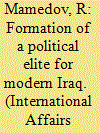

|
|
|
|
|
| Summary/Abstract |
THREE KEY EVENTS have changed both Iraq and the Middle East: the 1979 revolution in Iran, the Iran-Iraq war from 1980 to 1988, and the 1991 crisis in Kuwait. The latter led to a change in the domestic policies of Iraqi President Saddam Hussein and introduced new variables to the dynamics of the government's relations with ethnic and religious groups (mainly Shiites and Kurds). It was at this time that the UN began implementing sanctions on Iraq, including a blockade. The results of the sanctions left part of the elite with limited access to the distribution of resources; coupled with the government's practice of marginalizing a portion of the population, this led to migration and strengthening of exiled opposition forces. The U.S. brought not only economic but military pressure to bear on Baghdad. The U.S.'s tactical military incursions destroyed Iraq's infrastructure and disrupted the stable functioning of state structures.
|
|
|
|
|
|
|
|
|
|
|
|
|
|
|
|
| 16 |
ID:
165851
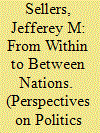

|
|
|
|
|
| Summary/Abstract |
Long a staple in the toolkit of American politics, comparison among subnational territorial units has gained increasing currency in comparative politics. A growing portion of subnational research, especially in the monographic literature, employs comparisons of subnational territorial units within different countries. This approach to comparison, which I term transnational comparison, has the potential to build on and extend the advantages of subnational comparison. Despite the numerous added challenges it poses, transnational comparison offers a variety of ways to incorporate and leverage variations between countries as well as within them. Drawing on exemplary studies from the literature on subnational regimes and beyond, I outline a typology of successful transnational comparative strategies. The choice among these strategies depends on their distinctive properties, on the substantive questions asked, and on the stage of a research program. All have contributed to advancing the study of politics beyond nation-centered comparison.
|
|
|
|
|
|
|
|
|
|
|
|
|
|
|
|
| 17 |
ID:
171280
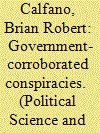

|
|
|
|
|
| Summary/Abstract |
Accusations of conspiracy are nothing new in American politics, but examples in which the government—usually cast as a key player in conspiracy theories—goes on record to corroborate that a conspiracy occurred are rare. I leveraged an experiment that randomly exposes both college-student and general-public subject pools to information about the 1979 House Select Committee on Assassination report of a probable conspiracy in the assassination of President John F. Kennedy. I find that those exposed to government corroboration of a conspiracy (1) are more prone to anger in response to the government report; (2) engage in an increased search of available media information about the assassination; and (3) are more likely to agree with the conclusion of a conspiracy in Kennedy’s murder. Implications for additional research about government pronouncements on controversial issues and follow-on public reaction also are discussed.
|
|
|
|
|
|
|
|
|
|
|
|
|
|
|
|
| 18 |
ID:
171195
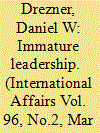

|
|
|
|
|
| Summary/Abstract |
There has been a renaissance in the study of how the backgrounds of individual leaders affect foreign policy outcomes. Donald Trump's presidency highlights the limits of this approach. Trump's psychology is so unique, and so akin to that of a small child, that studying his background alone is insufficient to explain his decision-making. The evidence for this characterization of Trump's leadership comes not from his political opponents, but his allies, staffers and subordinates. Trump's lack of impulse control, short attention span and frequent temper tantrums have all undercut his effectiveness as president as compared to his predecessors. Nonetheless, the 45th president helps to clarify ongoing debates in American politics about the relative strength of the presidency as an institution. In particular, the powers of the presidency have become so enhanced that even comparatively weak and inexperienced leaders can execute dramatic policy shifts. The formal checks on presidential power, from the legislative, judicial and executive branches have all eroded. Similarly, the informal checks on the presidency had also degraded before Trump's inauguration. This article uses Trump's presidency—and his severe limitations as a decision-maker—to highlight the ways in which even a weak leader can affect change by holding a powerful office.
|
|
|
|
|
|
|
|
|
|
|
|
|
|
|
|
| 19 |
ID:
120807


|
|
|
|
|
| Publication |
2013.
|
| Summary/Abstract |
Hardly the blow to democracy that many painted it as, the U.S. Supreme Court's decision in Citizens United will make American politics more competitive, less beholden to party bosses, and more responsive to the public at large. It may even help break the fiscal stalemate strangling the U.S. economy.
|
|
|
|
|
|
|
|
|
|
|
|
|
|
|
|
| 20 |
ID:
040840
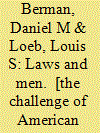

|
|
|
|
|
| Publication |
London, Macmillian, 1970.
|
| Description |
xiv, 432p.
|
|
|
|
|
|
|
|
|
|
|
|
Copies: C:1/I:0,R:0,Q:0
Circulation
| Accession# | Call# | Current Location | Status | Policy | Location |
| 004415 | 320.973/BER 004415 | Main | On Shelf | General | |
|
|
|
|
|
|
|
|
|